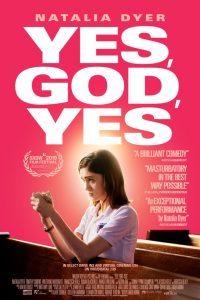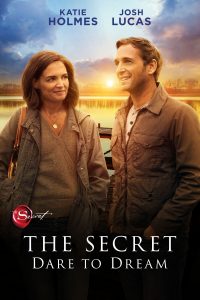

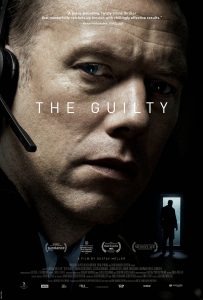





“The Secret: Dare to Dream” (2020). Cast: Katie Holmes, Josh Lucas, Jerry O’Connell, Celia Weston, Sarah Hoffmeister, Aidan Pierce Brennan, Chloe Lee, Katrina Begin, Sydney Tennant, Cory Scott Allen. Director: Andy Tennant. Screenplay: Bekah Brunstetter, Andy Tennant and Rick Parks. Story: Bekah Brunstetter. Book: Rhonda Byrne, The Secret. Web site. Trailer.
Oftentimes we spend considerable portions of our lives hoping that we’ll be the beneficiaries of our most cherished aspirations, especially when it comes to finding the loves of our lives. We hold out hope that the perfect soul mate will walk into our existence and join us in a life of happily ever after. But do we really believe in the possibility of that happening? And, if so, what does it take to realize it? Those are among the questions addressed in the new metaphysical romance, “The Secret: Dare to Dream.”
Miranda Wells (Katie Holmes) is a woman with a lot of challenges. The widowed mother of three has difficulty making ends meet, tries to prop up a house that’s falling apart and faces a variety of pressures on many different fronts. Oh, and now the Louisiana community where she lives is facing the prospect of a hurricane headed her way. What more could happen?
To her credit, though, Miranda has her share of allies in her corner. Her boss, Tucker Middendorf (Jerry O’Connell), owner of the seafood restaurant where she works as a manager, treats her well, both professionally and personally as a potential romantic interest. Her children – Missy (Sarah Hoffmeister), Greg (Aidan Pierce Brennan) and Bess (Chloe Lee) – are sometimes a little demanding but always have their mother’s back. And Miranda’s mother-in-law, Bobby (Celia Weston), never hesitates to help out, even if she can be a bit overbearing at times. But, even with all this assistance, Miranda’s about to receive a new and even bigger source of help, one she never saw coming.
[caption id="attachment_11697" align="aligncenter" width="350"]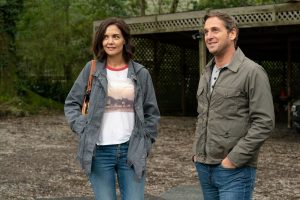 Challenged single mother Miranda Wells (Katie Holmes, left) receives an unexpected wealth of help from a visiting engineering professor, Bray Johnson (Josh Lucas, right), after a minor traffic accident in the new metaphysical love story, “The Secret: Dare to Dream.” Photo by Alfonso Pompo Brescianni, courtesy of Roadside Attractions/Lionsgate.[/caption]
Challenged single mother Miranda Wells (Katie Holmes, left) receives an unexpected wealth of help from a visiting engineering professor, Bray Johnson (Josh Lucas, right), after a minor traffic accident in the new metaphysical love story, “The Secret: Dare to Dream.” Photo by Alfonso Pompo Brescianni, courtesy of Roadside Attractions/Lionsgate.[/caption]
While driving home after work to prepare her house for the approaching storm, Miranda gets into a tiff with Missy over her impending Sweet 16 party, an argument that distracts her and results in a fender bender, the last thing she needs at a time like this. Fortunately, the crash victim is unhurt and proves to be an eminently reasonable soul; as Miranda freely acknowledges her responsibility for the incident, the other driver, Bray Johnson (Josh Lucas), assures her that it’s no big deal, pointing out that her aging minivan bore the brunt of the damage and that his hulking pickup truck was virtually unharmed. In fact, he’s so laid back about things that he offers to repair her vehicle to keep the insurance company from becoming involved. Miranda is stunned by the offer, but, when Bray reveals he’s a Vanderbilt University engineering professor who just happens to be in town on business, she agrees to his generous and thoughtful proposal. It also doesn’t hurt that she quietly finds him cute, a feeling that appears to be mutual.
Bray follows Miranda to her home to work on the repairs when he comes upon a startling realization – she lives at the same place where he had stopped by earlier in the day to conduct the business that brought him to town in the first place. But, since she was not present at the time, her absence kept him from taking care of things. And now that he’s caught up in the repair work, as well as a boatload of questions from Miranda’s ever-inquisitive children, he decides the timing isn’t right to discuss business and holds off on saying anything.
In gratitude for his unexpected help, Miranda invites Bray to stay for dinner, at which point everyone starts to get to know one another better. The discussion turns somewhat philosophical as Miranda details the many challenges she faces, and it’s apparent that she’s a firm believer in Murphy’s Law. By contrast, Bray shares his viewpoint, one that’s based on the idea that “the glass is half full” and that help always seems to arrive just when one needs it. He offers analogies to illustrate his point, but he never pushes his perspective on his host. However, if Miranda has any common sense, she should realize that, based on her own recent experience, he’s right.
[caption id="attachment_11698" align="aligncenter" width="350"] Single mother Miranda Wells (Katie Holmes, left) faces a variety of challenges raising her three children, Greg (Aidan Pierce Brennan, second from left), Missy (Sarah Hoffmeister, second from right) and Bess (Chloe Lee, right), in the new metaphysical love story, “The Secret: Dare to Dream.” Photo by Alfonso Pompo Brescianni, courtesy of Roadside Attractions/Lionsgate.[/caption]
Single mother Miranda Wells (Katie Holmes, left) faces a variety of challenges raising her three children, Greg (Aidan Pierce Brennan, second from left), Missy (Sarah Hoffmeister, second from right) and Bess (Chloe Lee, right), in the new metaphysical love story, “The Secret: Dare to Dream.” Photo by Alfonso Pompo Brescianni, courtesy of Roadside Attractions/Lionsgate.[/caption]
With the storm about to make landfall, Bray makes his exit, again without completing his unfinished business. Yet, little does anyone know, this seemingly innocuous and random encounter marks the beginning of a deeper, more involved connection, one that unfolds with a variety of unforeseen implications. And it’s a story that reflects much of what Miranda and Bray discussed over dinner, a scenario with ramifications on an array of fronts.
Upon closer examination of Bray’s prevailing outlook on life, we see that he believes we draw into our lives what we focus on, for better or worse. This is the philosophy behind the law of attraction (a.k.a., conscious creation), which maintains that our lives and existence are shaped by the power of our thoughts, beliefs and intents, with the resulting conditions mirroring whatever input we provide. It’s ultimately what accounts for the positivity that pervades Bray’s life and the challenges that characterize Miranda’s existence. And it’s why Bray’s needs are met whenever they arise and why Miranda’s burden always seems to grow ever larger.
At its heart, the law of attraction is a fairly simple concept, one that faithfully lives up to its core principle. But it should also be noted that it’s not a fixed notion, either; it’s subject to change, depending on whatever thoughts, beliefs and intents we put into it. It would be just as easy for Miranda to attain the same kinds of outcomes as Bray as long as she puts forth beliefs in line with those sought-after results. All she need do is shift her focus.
Admittedly, this may not always be easy, especially if we’re accustomed to thinking, believing and intending along particular lines. It’s unclear how long Miranda has been sending out her disconcerting vibes, though much of her trouble seems to have begun when her husband, Matt (Corey Scott Allen), was killed in a plane crash. The kindly but largely unsuccessful inventor wasn’t always the best provider to begin with, but his death left her saddled with the responsibility for raising her three children alone, as well as the other problems noted earlier.
[caption id="attachment_11699" align="aligncenter" width="350"]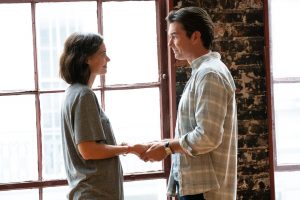 Restaurant manager Miranda Wells (Katie Holmes, left) seeks to manage both a professional and romantic relationship with her boss, Tucker Middendorf (Jerry O’Connell, right), in “The Secret: Dare to Dream,” a fictionalized adaptation of Rhonda Byrne’s wildly popular self-help video and book. Photo by Alfonso Pompo Brescianni, courtesy of Roadside Attractions/Lionsgate.[/caption]
Restaurant manager Miranda Wells (Katie Holmes, left) seeks to manage both a professional and romantic relationship with her boss, Tucker Middendorf (Jerry O’Connell, right), in “The Secret: Dare to Dream,” a fictionalized adaptation of Rhonda Byrne’s wildly popular self-help video and book. Photo by Alfonso Pompo Brescianni, courtesy of Roadside Attractions/Lionsgate.[/caption]
However, as Bray’s observations – and presence – indicate, Miranda’s circumstances indeed need not be set in stone. And, as their interaction grows, further proof of this emerges. Bray brings to the table what Miranda needs, and this prompts realizations that cause her beliefs to shift. Before long, the glass is no longer half empty.
Of course, there’s more to all this than just adjusting our thinking. It’s important to recognize the emergence of clues that indicate we’re getting what we ask for (again, as always, for better or worse). These materialized hints, known as synchronicities, offer manifested evidence of our intents coming to life. These seemingly perfectly tailored “coincidences” often jump out at us with stunning clarity, though sometimes they may be more subtle, taking forms that aren’t readily recognizable at first glance. For example, Miranda’s fender bender might initially appear to be yet another challenge she doesn’t need. However, as events unfold, it proves to be exactly what she needs in a variety of areas. One could say this is the proverbial silver lining in the cloud. At the same time, though, it could also be that Miranda had been so oblivious to the existence of the law of attraction that she needed something significant to “jolt” her into awareness, something that a car accident could achieve quite effectively (and rather metaphorically at that). Some have characterized this as God whispering in our ears, an apt description, to be sure. We just need to make certain that we’re listening.
While much of what happens in “Dare to Dream” deals with the law of attraction at work in a romantic context, it’s by no means limited to this application. It can be employed in attaining whatever we need, for it applies to the creation of the totality of our existence, not just random components. So, even though we may be using it to manifest a particular objective, that doesn’t mean it’s stopped working in other areas that are receiving less of our attention. Those materializations may go on autopilot as we focus the majority of our intents in other directions, but they’re in operation nevertheless, creating a reality based on whatever thoughts, beliefs and intents we have allowed to settle into place as we work our magic in our primary area of attention.
[caption id="attachment_11700" align="aligncenter" width="350"] Long-simmering romantic feelings are put to the test for single mother Miranda Wells (Katie Holmes, right) and divorced engineering professor Bray Johnson (Josh Lucas, left) in “The Secret: Dare to Dream,” now available for first-run online streaming. Photo by Alfonso Pompo Brescianni, courtesy of Roadside Attractions/Lionsgate.[/caption]
Long-simmering romantic feelings are put to the test for single mother Miranda Wells (Katie Holmes, right) and divorced engineering professor Bray Johnson (Josh Lucas, left) in “The Secret: Dare to Dream,” now available for first-run online streaming. Photo by Alfonso Pompo Brescianni, courtesy of Roadside Attractions/Lionsgate.[/caption]
What’s most crucial to remember in all this, though, is that our reality emerges in line with our focus and in highly tailored ways (as the synchronicities illustrate). Because of that, we must continually be aware of the specific thoughts, beliefs and intents we’re putting forth, for the results will reflect them with sparkling fidelity. This means examining those inputs down to the finest of nuances, for they will provide the shading and coloring to the overall manifestations. If we allow undermining influences to creep into our focus, for example, we’re likely to see such elements showing up in the end result. If we hold a vision of a particular outcome but it’s tainted by doubt, for instance, our sought-after result may materialize in a distorted form – or not at all – no matter how convinced we may think we are about the viability of the manifestation of the primary goal. Indeed, this speaks directly to the idea of “Be careful what you wish for.”
When examined from an overarching perspective and applied skillfully, the law of attraction truly can make miracles happen. What’s more, the palette of possibilities is open-ended; it all depends on what we do with it. However, as the film’s title suggests, all we really need do is dare to dream, because, in the end, dreams indeed can come true.
While admittedly schmaltzy, sometimes predictable, cloyingly cheerful and thinly written, this long-simmering love story based on the metaphysical teachings of the wildly successful self-help video and book “The Secret” (2006) is clearly an easy target for cynical critics and skeptics of the material’s basic premises. What’s more, the look and feel of the film often seem like something straight off The Hallmark Channel or Lifetime Television. Nevertheless, this crowd-pleasing take on law of attraction philosophy does a more than capable job of illustrating its rudimentary principles without belaboring the instructional aspect, working its ideas into the narrative seamlessly, subtly and effectively. This is not groundbreaking cinema, but it is by far one of the best fictionalized cinematic adaptations of self-help material for the big screen that I have ever seen. Even if somewhat sappy, it’s refreshing to see an uplifting release come along that offers viewers hope and inspiration during trying times – or any time for that matter. The film is available for first-run online streaming.
We’re all familiar with the old adage that maintains “Love springs eternal.” And, thanks to the law of attraction, it’s more achievable than most of us realize. However, if we keep the possibility at arm’s-length, we may forever wander the romantic landscape on our own, hoping against hope that something will happen with a mindset that contends otherwise. But, with a change of mind, we can attain a change of fortune, one bound to bring about a change of heart – for real.
Copyright © 2020, by Brent Marchant. All rights reserved.
“Mighty Oak” (2020). Cast: Janel Parrish, Tommy Ragen, Carlos PenaVega, Levi Dylan, Ben Milliken, Nana Ghana, Rodney Hicks, Gianna Harris, Alexa PenaVega, Raven-Symoné, Bill Lewis, Linda Ardell Wendfeldt, Marco Drapeau, Thomas Kasp. Screenplay: Matt R. Allen. Story: Frank Ragen and Matt R. Allen. Web site. Tariler.
Most of us have heard of the concept of reincarnation, and many of us – including skeptics – are intrigued by the notion. It’s become so ingrained in the culture that we’ve even embraced sayings like “not in this lifetime,” implying matter-of-factly that there’s more than just one incarnation. But how many of us are willing to look past our doubt and genuinely buy into the principle without definitive proof of its existence? That’s one of the questions up for debate in the new family-friendly/young adult comedy-drama, “Mighty Oak.”
Members of the rock band Army of Love and thrilled with their success. As rising stars in the music world, the San Diego-based band members are happy about the growing number of viewers checking out their online videos, as well as the performance opportunities coming their way, such as a gig to open for a headline act at the Hollywood Bowl. Much of that success comes from the band’s charismatic front man, guitarist and lead vocalist Vaughn Jackson (Levi Dylan), and the astute marketing of the group’s savvy manager, Gina (Janel Parrish), Vaughn’s sister. Indeed, Army of Love really seems to be going places.
But that all changes one fateful night as the band heads home. In an instant, their future takes a dramatic left turn when a drunk driver hits their vehicle, killing Vaughn, as well as the opportunities awaiting them. It’s a tragedy that carries incalculable costs for all involved.
In the decade after Vaughn’s death, the band members go their separate ways, taking jobs they dislike just to make ends meet. When he’s not giving music lessons to a talentless rock wannabe (Thomas Kasp), backup guitarist Pedro (Carlos PenaVega) works in a restaurant and bar owned by his friend, D.B. (Rodney Hicks), a venue where Army of Love frequently performed. Bassist Alex (Nana Ghana) takes a job as a diner manager, a thankless position where she’s subjected to endless inane requests from irritating customers. And drummer Darby (Ben Milliken) lands a gig in a vintage vinyl store, a job where he drinks his days away when he’s not chasing skirts and shamelessly hawking Army of Love CDs. But the person most severely affected by this tragedy is Gina; she not only lost her brother, but also her livelihood, a development that led to substance abuse, gambling and institutionalization. She misses her brother dearly, and she has trouble coping with the fallout of these circumstances, difficulties that came on the heels of a troubling childhood in which she and Vaughn were routinely shuttled from one foster home to another.
But, as unexpectedly as events unfolded 10 years earlier, new equally unanticipated developments now begin to take shape. In the apartment building adjacent to D.B.’s restaurant and bar (a property he also owns), two new tenants move in, single mother Valerie (Alexa PenaVega), a naval veteran with health issues, and her 10-year-old son, Oak (Tommy Ragen). As D.B.’s daughter, Emma (Gianna Harris), befriends the arrival of her new contemporary, she soon learns that he’s quite a talented musician and songwriter, completely self-taught. Emma is so impressed that she convinces her dad to give him a welcome gift, the guitar that belonged to Vaughn, which had been sitting unused in D.B.’s place for the past decade.
Oak is thrilled, to say the least, even though D.B.’s decision doesn’t set well with Pedro or Gina. Pedro wonders why D.B. would hand off such a cherished item to a virtual stranger, especially since he could have made use of it himself. And Gina is upset that one of her brother’s prized possessions was given away so seemingly thoughtlessly. But, when Pedro and Gina hear Oak play the instrument for the first time, they’re blown away by the prodigy. He’s a sensation, to be sure. However, on top of that, Oak’s guitar technique and stage mannerisms are virtually identical to those of Vaughn. The eerie experience leaves Gina with the unsettling yet uplifting feeling that the young axe virtuoso may be the reincarnation of her late brother.
Given Oak’s knock-out debut, Gina is anxious to get the band back together, especially since she believes she may have a novel marketing angle to draw upon in promoting the group’s comeback. It’s an undertaking simultaneously fueled by a curious mixture of enthusiasm (from Alex, Darby, Emma, and, to a certain degree, Pedro) and opposition (from Valerie and, ironically, to a certain degree, Pedro). And, as this effort plays out further, there are numerous twists and turns involving the relationship between Oak and his band mates, Valerie’s health, and, of course, further hints as to Oak’s true identity. The rollercoaster ride on which everyone is about to embark leads to a series of triumphs, setbacks and unforeseen developments.
Reincarnation is one of those subjects that tends to divide people along very defined lines. Many dismiss it as pure fantasy, while others are hard core believers. But there are also those in the middle, borderline skeptics who could nevertheless be swayed by evidence that lends credence to the validity of the theory. In the end, it’s the beliefs each of us hold that determine what unfolds, as is the case with everything in our reality, for those manifestations are the products of the conscious creation process, the philosophy that maintains our existence is shaped by these metaphysical building blocks.
If that indeed is the case, however, why does the subject of reincarnation lead to such diverse reactions? And, in light of that, one might then wonder why have they manifested as they have in this particular scenario? Those are questions that truly provide much food for thought.
For the surviving members of Army of Love, there has been much anguish over the loss of their beloved colleague. They miss him terribly, both as an artistic collaborator and as a friend and relative. They really wish he was still with them. But, if that’s the case, why would many of them (except Gina perhaps) be so skittish about his possible return as Oak? What’s more, it raises another equally legitimate question: Why would Vaughn seek to come back?
Those questions can’t be answered simply, because there are multiple considerations involved in a situation like this, both on a personal level and in terms of “the bigger picture,” and those considerations apply to both Vaughn and to those who survived him. It’s a complex co-creation, to be sure, one with many aims to be fulfilled, even if those manifesting them aren’t fully aware of why they’re doing so or, even more fundamentally, of the existence of the very process involved in pulling it off.
Perhaps the most important consideration in this is raising awareness of reincarnation, providing sufficient evidence to eliminate doubt as to the validity of its existence. It’s one of those “bigger picture” concerns designed to make us aware of the legitimacy of this phenomenon, in this case both for Vaughn’s familiars and, perhaps by extension, more widely for the fans of Army of Love (through Gina’s proposed marketing efforts for the reunited band). Making such evidence available is a powerful tool in helping to change the hearts, minds and beliefs of others, to enlighten them to something about our basic nature that has long escaped our awareness or that we have not taken seriously. That’s an important step not only toward raising our awareness of this particular aspect of our existence, but also of our understanding of our greater selves. And, when armed with knowledge like that, we can begin to take giant strides forward in our comprehension of our higher being and the nature of the Universe.
On a more personal level, there are additional considerations involved. Vaughn’s return as Oak helps the band members heal their loss, most notably through an awareness that their friend and relative is always with them, be it in spirit, in modified corporeal form or some combination of both. That can be tremendously comforting to those who have experienced such a tragedy, easing the pain and providing an opportunity for their “relationship” to evolve to a new form. That’s a bonus to the bigger picture considerations already afforded them, one that’s more heartfelt, touching and endearing.
It’s also a gift to Oak as he becomes aware of who he might really be. It enables him to tap into aspects of himself that he may not have otherwise known existed. What’s more, it gives him an appreciation of a fundamental part of existence that is often drummed out of the beliefs of many of us at an impressionable age. By developing an awareness of such knowledge at an early point in his development, he’s able to potentially save himself years of frustration in trying to figure out something about his basic nature that many of us take decades to discover, if at all.
Of course, at the same time, one can’t help but wonder why it took such a tragedy to bring this about. Couldn’t there have been some other way to produce these results? Why did Vaughn have to end his life for this to happen?
As with any manifestation, our reasons for our creations are our own, and it’s no one else’s place to question them. However, in this case, perhaps Vaughn could see no other way to bring about the results he was seeking with the same impact as this event did, tragic though it may have been. If he believed that raising awareness about the foregoing issues could best be achieved through these means, then, given the results he obtained, one could say he was correct. Who can fault that?
But it could be argued that there was more behind this particular manifestation. Vaughn may have known that his greater self still had artistic accomplishments to fulfill, and his return as Oak could provide that opportunity, both for himself and for a budding prodigy who may not have had any other means to achieve that goal. There’s also a benefit for his band mates, who now have an opportunity to see their collaboration resume. And, with a name like Army of Love, the band once again has a chance to bring a message to the world that is embodied in the group’s very name, something that a weary world could certainly use more of these days. All things considered, Vaughn’s death and reincarnation as Oak could thus be seen as quite a jam-packed, uplifting manifestation, wouldn’t you say?
When it comes to this family-oriented/young adult comedy-drama, as well as its metaphysical message, the film’s heart may be in the right place, but its execution could use some work. This story touches on some serious and thoughtful subject matter, but that material is often cheapened by attempts at softening it to make it less intense and more youth-friendly. What’s more, the family-friendly aspects are occasionally intruded upon by decidedly more adult material, making for an odd combination of story elements. Add to that production values, writing, acting and direction that come straight out of a cheesy made-for-cable movie, and you’ve got an even stranger concoction. Yet, for all these shortcomings, “Mighty Oak” genuinely seems sincere enough in its attempt to tell a heartfelt and insightful tale that will appeal to its apparent target audience. So, if you can look past these issues, you’ll find a modestly entertaining offering that’s likely to please those who it was made for, as well as those with a mystical bent. Just don’t expect epic filmmaking. The picture is available for first-run online streaming.
It’s a pretty safe bet that most of us would like to think that we get more than just one go-round at this thing we call life. Having additional opportunities to fulfill goals that were left unfinished in one lifetime or to make up for past transgressions or to experience the unexperienced all certainly have a lot of appeal, and reincarnation makes that possible. But, as with any such creation, our belief in the concept is crucial if we’re to see it materialize. Should we proceed down such a path, however, with an unshakable faith in our conviction, we just might see that opportunity arise, one whose viability is genuinely sound – and as sturdy as a mighty oak.
Copyright © 2020, by Brent Marchant. All rights reserved.
Tune in for the latest Cinema Scribe segment on Bring Me 2 Life Radio, Tuesday, August 18, at 2 pm ET, available by clicking here. And, if you don't hear the show live, catch it later on demand. Please note that, beginning in September, the broadcast schedule for The Cinema Scribe will be changing to the second and fourth Tuesdays of the month, same time, same link. Be sure to tune in!

“The Guilty” (“Den skyldige”) (2018). Cast: Jakob Cedergren, Jessica Dinnage (voice), Omar Shargawi (voice), Johan Olsen (voice), Jacob Hauberg Lohmann (voice), Katinka Evers-Jahnsen (voice), Jeanette Lindbæk (voice), Simon Bennebjerg (voice), Laura Bro (voice), Guuled Abdi Youssef (voice), Morten Suurballe (voice), Caroline Løppke (voice), Morten Thunbo, Maria Gersby Cissé, Anders Brink Madsen. Director: Gustav Möller. Screenplay: Gustav Möller. Web site. Trailer.
The well-meaning among us no doubt want to do all we can to aid those in need. But is it possible for there to be too much of a “good” thing? In an effort to be of service, there’s always the possibility we can go too far, making a difficult situation worse than it needs to be. Such is the challenge faced by an idealistic first responder in the gripping Danish drama, “The Guilty” (“Den skyldige”).
Copenhagen Police Officer Asgar Holm (Jakob Cedergren) is frustrated by his job. He’d like to be back on the street, doing the kind of police work that he so loves. But, since he’s currently on probation for an incident under investigation, he’s been reassigned to work the phones at the city’s Emergency Services office. Asgar is bored answering calls like that from a mugging victim (Morten Suurballe) who had his personal property stolen by a street walker in Copenhagen’s red light district, a neighborhood the caller innocently claimed to know nothing about. Then there’s a drunk woman (Caroline Løppke) who makes no sense about why she’s calling, a brief but irritating conversation that works Asgar’s last nerve. And then there’s a plea from a junkie (Simon Bennebjerg) who’s seeking help but can’t bring himself to provide the information Asgar needs to get him proper assistance. It’s enough to fray his otherwise-calm and collected demeanor.
Thankfully, there are a few distractions, such as phone exchanges with Asgar’s buddy Bo (Jacob Hauberg Lohmann), an old friend who works as a dispatcher in the Services’ Copenhagen office. Asgar also takes calls from his street partner, Rashid (Omar Shargawi), a voice he’s pleased to hear. The substance of these calls may not be what Asgar wants to hear – discussions about an upcoming hearing regarding the incident that placed him on probation – but they at least break the tedium of the calls he’d rather not deal with.
[caption id="attachment_11682" align="aligncenter" width="350"] Copenhagen Police Officer Asgar Holm (Jakob Cedergren), on probation for a work-related incident, spends his days working the phones in the city’s Emergency Services office, a job that frustrates a professional who wishes he was back out on the streets, in director Gustav Möller’s gripping psychological thriller, “The Guilty” (“Den skyldige”), available in various home viewing formats. Photo courtesy of Magnolia Pictures.[/caption]
Copenhagen Police Officer Asgar Holm (Jakob Cedergren), on probation for a work-related incident, spends his days working the phones in the city’s Emergency Services office, a job that frustrates a professional who wishes he was back out on the streets, in director Gustav Möller’s gripping psychological thriller, “The Guilty” (“Den skyldige”), available in various home viewing formats. Photo courtesy of Magnolia Pictures.[/caption]
Circumstances take a sudden turn, however, when Asgar receives a call from a young woman named Iben (Jessica Dinnage). Asgar is puzzled by what she says; she sounds more like a sex line worker who specializes in a mothering fetish than someone genuinely in trouble. However, he quickly realizes that she’s caught up in a situation where she can’t talk and that she’s pretending to speak with her daughter. Asgar launches into a line of questioning to find out what’s going on.
As it turns out, Iben has apparently been kidnapped by her husband, Michael (Johan Olsen), an ex-convict with a history of violent assault. They appear to be in a van headed out of town toward the City of Elsinore in the North Zeeland district. And, even though they appear to be moving away from Copenhagen, Iben is concerned about the safety of her two children, who have been left alone at home. Given her husband’s record, it would appear she has cause for worry.
Asgar contacts a local dispatcher (Jeanette Lindbæk), who takes down the information he’s compiled. She assures him that her staff will handle matters from there. However, given the gravity of the situation, Asgar can’t bring himself to leave matters alone, despite the local dispatcher’s reassurances. What’s more, since his shift is coming to an end, he’s told to go home and let his colleagues field any new local developments that arise; with his hearing coming up the next day, they tell him to go get some much-needed rest before the proceeding – advice that he promptly ignores.
Staying on the phone, Asgar makes further inquiries, such as with Iben’s young daughter, Mathilde (Katinka Evers-Jahnsen), who tearfully provides more background about what went on in the house before her parents left. He arranges for child care services personnel to visit the house and forwards the additional information to the North Zeeland dispatcher, who wonders why he’s still working a case that he was told to leave in their hands.
[caption id="attachment_11683" align="aligncenter" width="350"]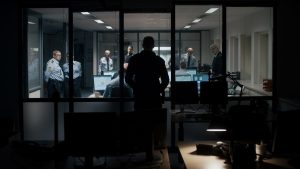 The Copenhagen Emergency Services office is the site of a gripping drama that plays out entirely over the phone in writer-director Gustav Möller’s psychological thriller, “The Guilty” (“Den skyldige”). Photo courtesy of Magnolia Pictures.[/caption]
The Copenhagen Emergency Services office is the site of a gripping drama that plays out entirely over the phone in writer-director Gustav Möller’s psychological thriller, “The Guilty” (“Den skyldige”). Photo courtesy of Magnolia Pictures.[/caption]
So why is Asgar so determined to stay involved? Having learned about Michael’s history and after hearing Iben’s frightened and woeful voice, his compassion comes rushing forth. He believes he’s figured out what’s transpiring, and he wants to make a difference, something he feels he hasn’t been able to do ever since he’s been placed on probation. He doggedly keeps working the case, even reluctantly dragging Rashid into an investigation that’s now verging on employing legally and ethically questionable tactics. He desperately wants to see justice done.
But is Asgar truly following the right course with his behavior? Does the end justify the means? And what if everything is not what it seems – then what? As this tense scenario plays out, the idealistic officer may find himself embroiled in something far more complicated than he ever imagined, a situation that carries consequences he never envisioned. And, for viewers, it’s a riveting experience, since virtually the entire drama plays out over the phone within the confines of the Emergency Services headquarters, the characters’ voices carrying the story through its many emotional contortions.
For his part, Asgar truly is a deeply committed, compassionate person who’s trying to bring that part of himself out through his work. That’s why he’s so frustrated in his current capacity; he believes he’s not able to apply himself as effectively as he would if he were back out on the streets. So he bides his time, endeavoring to be as compliant and cooperative as possible until he’s allowed to resume his normal routine. But, despite his intent to do so (half-hearted though it may be), he has difficulty following protocol, especially when he’s confronted with a situation like the one involving Iben. He so desperately wants to help that he can’t stand on the sidelines, even if overstepping his bounds complicates his circumstances further.
Asgar believes he can make a difference, so much so that it governs his actions. Those beliefs play a vital role in how events unfold, a process that materializes in line with the principles of conscious creation, the philosophy that maintains we draw upon these resources in manifesting the reality we experience. And, even if he has never heard of this practice, that’s what Asgar is nevertheless so eager to see play out.
When tempered with wisdom, it’s entirely possible to see our objectives realized. But there’s another side of the coin; if allowed to become overrun by overzealousness and/or a myopic point of view, we can set ourselves up for trouble, no matter how earnest our underlying intents may be. This is the point where we may fall prey to the practice of un-conscious creation, a process whereby we seek the fulfillment of our goals at any cost, regardless of the means we employ for achieving them or the consequences that can result. Such situations can bring unintended fallout and distorted aspirations, sometimes with tragic outcomes.
[caption id="attachment_11684" align="aligncenter" width="225"]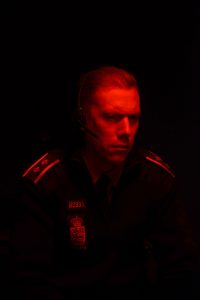 As he overhears the unfolding of a possible kidnapping, Copenhagen Emergency Services responder Asgar Holm (Jakob Cedergren) plunges into the depths of emotion in the riveting drama, “The Guilty” (“Den skyldige”), available in various home viewing formats. Photo courtesy of Magnolia Pictures.[/caption]
As he overhears the unfolding of a possible kidnapping, Copenhagen Emergency Services responder Asgar Holm (Jakob Cedergren) plunges into the depths of emotion in the riveting drama, “The Guilty” (“Den skyldige”), available in various home viewing formats. Photo courtesy of Magnolia Pictures.[/caption]
As much as Asgar believes he has circumstances figured out, and as thoroughly convinced as he is about what needs to be done, he’s so fixated on what he seeks to achieve that his vision – and the beliefs that drive it – could well become clouded. He’s unable to seek through the camouflage that has come to obscure his view. And allowing that to happen can cause our perspective to become obstructed, no matter how noble or compassionate we may think we are.
When we set off on such a path, we may quickly find ourselves having to engage in some serious mopping up activities. Escaping such circumstances can be tricky, too, with much depending on how we approach the situation. Should we rigidly stick to our convictions, we’re likely to dig ourselves into even deeper holes. But, if we make the effort to examine things honestly, we may be able to at least stop the bleeding, if not turn conditions around. That might not be easy, but it would certainly be in line with our personal integrity, which can go a long way toward making matters right. It could even lead to redemption, which could offer a new start for ourselves, as well as those impacted.
As Iben’s story unfolds, Asgar has an opportunity to see how the foregoing dynamics work in a situation like this. However, it also provides him with a lesson that transcends the handling of the current crisis; it gives him insight into his personal circumstances, most notably how to approach his upcoming hearing. And that, in the long run, may prove to be a more valuable learning experience than he ever thought possible.
This chilling tale serves up a taut, edge-of-your-seat psychological thriller about one man’s valiant efforts to aid in the investigation of a possible kidnapping under circumstances where the entire story is far from clear. Told through a series of phone conversations between the officer and his colleagues, the victim and the alleged perpetrator, writer-director Gustav Möller skillfully relies on the sound of his performers’ voices to drive the narrative, forcing viewers to use their own imaginations to visually fill in the gaps, an expert use of Hitchcock’s rule if there ever were one. The result is a harrowing journey into the minds of the characters, as well as the viewers’ own minds, aided by a script loaded with unexpected twists and turns. This captivating offering reaches out and grabs the audience’s attention, never letting go, despite its simple, play-like staging, presenting a gripping story that only gets better the further along it goes. This vastly underrated cinematic knock-out is available for home viewing in a variety of formats.
While “The Guilty” may not have attained widespread notoriety, it certainly captured the attention of critics, film festivals and awards competitions, taking home nominations and honors in a variety of milieus. Of particular note, the picture was named one of 2018’s top foreign films by the National Board of Review. In addition, the film was named the Audience Award winner in the World Cinema – Dramatic category at the 2018 Sundance Film Festival, a competition in which it also earned a Grand Jury Prize nomination. But those accolades tell only a part of the story behind the recognition for this well-received, if little-known, offering.
They say there’s a Samaritan in all of us, and that’s comforting to know, especially in an age like ours, where we can use all of the help and cooperation we can get. However, if we allow our convictions to get the better of us, we run the risk of becoming obsessive, even fanatical, and, as history has shown us so many times – including today – that does no one any good, either. Asgar’s story provides us with a cautionary tale that we’d be wise to heed if we want to help our fellow man without creating havoc in the process, showing us that there genuinely are times when “good enough” is indeed “good enough” – even if it doesn’t always seem that way.
Copyright © 2020, by Brent Marchant. All rights reserved.


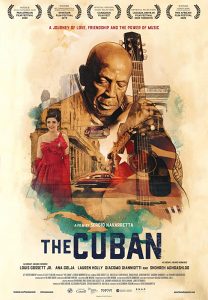

“My Dog Stupid” (“Mon chien Stupide”) (2019). Cast: Yvan Attal, Charlotte Gainsbourg, Eric Ruf, Pascale Arbillot, Ben Attal, Adèle Wismes, Pablo Venzal, Panayotis Pascot, Oscar Copp, Lola Marois, Sébastien Thiery, Franz Lang. Director: Yvan Attal. Screenplay: Stéphane Guillon and Dean Craig. Story: Dean Craig, Yvan Attal and Yaël Langmann. Book: John Fante, West of Rome. Web site. Trailer.
Most of us feel dissatisfied with our lives from time to time. Sometimes we have only a vague sense of what’s irking us, but often we have a clear picture of the irritation. Still, even with such an awareness, we frequently lack an understanding of how to fix the problem. Perhaps looking to the source of that discontent can help us figure out how to implement much-needed change. But, in doing so, we need to know where to look, something that may prove difficult – and surprising – as seen in the delightful and introspective new French comedy-drama, “My Dog Stupid” (“Mon chien Stupide”).
Henri Mohen (Yvan Attal) is one discontented guy. The 55-year-old onetime-successful French author hit a home run with a best seller 25 years ago, but he hasn’t written anything worthwhile (or lucrative) since then. True, his first work enabled him to live comfortably in a seaside estate that helped him escape what he saw as the unceasing drudgery of Paris, but there was a trade-off: That villa also became home to Henri and his family, whom he believes have grown progressively ungrateful over the years. With his wife, Cécile (Charlotte Gainsbourg), and their four ne’er-do-well adult children, Henri struggles to keep his sanity and self-respect amidst the incessant complaining and tribulations of a dysfunctional family who shows him no appreciation for the generous support and well-heeled lifestyle he has provided them.
So why are Henri’s wife and children so irritating? Well, for starters, there’s Cécile, who never seems satisfied with her life, a nagging, unrelenting discontent that she always seems to find a way to blame on Henri. Then there are his kids: Raphaël (Ben Attal), his eldest, drifts through life, spending his days smoking weed and cruising the internet for porn and women who are all too eager for a party, such as his principal squeeze, Marie-Lise (Lola Marois); Pauline (Adèle Wismes), Henri’s only daughter, who runs through money like water and spends most of her time fawning over her uber-macho boyfriend, Hugues (Oscar Copp), a former soldier who frequently brags about his allegedly heroic exploits in Syria; Gaspard (Panayotis Pascot), a surfer dude who’s barely hanging on in his college studies, even with the coddling assistance of Cécile, who does his homework for him; and Noé (Pablo Venzal), an honor student with a strong social consciousness who seems to have it all together but who also harbors a secret that doesn’t become revealed until authorities show up unexpectedly at the family doorstep one day. Nice relatives.
[caption id="attachment_11665" align="aligncenter" width="350"] Once-successful author and discontented family man Henri Mohen (Yvan Attal) seeks to turn his life around through his impulsive adoption of a big, slobbering dog in the delightful new French comedy-drama, “My Dog Stupid” (“Mon chien Stupide”). Photo by David Koskas, courtesy of Film Distrib US.[/caption]
Once-successful author and discontented family man Henri Mohen (Yvan Attal) seeks to turn his life around through his impulsive adoption of a big, slobbering dog in the delightful new French comedy-drama, “My Dog Stupid” (“Mon chien Stupide”). Photo by David Koskas, courtesy of Film Distrib US.[/caption]
The only family member who ever gives Henri the time of day is Noé, and even that support eventually becomes compromised for reasons outside of Henri’s control. The rest generally berate or ignore him, showering him with scorn or indifference. That leaves Henri alone with his thoughts much of the time, an opportunity to brood and to occasionally wax nostalgically about the one time in his life when he felt genuinely happy – his days in Rome when he was writing the book that would become his only success. He wishes he could return there and relive those glory days. But such hopes seem like a pipe dream now, leaving him to go back to the tasks that occupy his days – obsequiously fulfilling the family’s never-ending list of inconsequential shopping requests and attempting to write something meaningful.
Matters take a curiously quirky turn, however, when a surprise visitor shows up in Henri’s backyard one rainy evening – a big, slobbering dog that appears to be a stray. The canine, which resembles a shar-pei/mastif mix, wastes no time making himself at home, lumbering through an open door into the family residence and settling in, claiming a couch and gobbling virtually anything he can find to eat. This is in addition to his other voracious appetite: his need to indulge his insatiable libido, a hunger he readily inflicts on the human males he encounters, most notably, of all people, Hugues.
Needless to say, no one is particularly thrilled with the arrival of the unexpected house guest. Cécile, Pauline, Raphaël and Gaspard beg Henri to do something about the dog (just as they always seem to beg him to do something about anything they dislike), but, in this case, even Dad isn’t pleased with this new development. However, Henri’s attitude soon changes when he sees how lovable the dog can be. Admittedly, the pooch isn’t particularly bright, but he’s adorable nonetheless, a trait that becomes apparent when the only household member who takes a liking to him – Noé – manages to bring out his unique canine charm. At this point, Henri takes a shine to him as well and abandons all plans to pawn him off on the local SPCA. Instead, he adopts his newfound friend and names him, appropriately enough, Stupid.
[caption id="attachment_11666" align="aligncenter" width="350"] Long-married couple Henri and Cécile Mohen (Yvan Attal, left, and Charlotte Gainsbourg, right) wrestle with the state of their relationship in the introspective French comedy-drama, “My Dog Stupid” (“Mon chien Stupide”). Photo courtesy of Film Distrib US.[/caption]
Long-married couple Henri and Cécile Mohen (Yvan Attal, left, and Charlotte Gainsbourg, right) wrestle with the state of their relationship in the introspective French comedy-drama, “My Dog Stupid” (“Mon chien Stupide”). Photo courtesy of Film Distrib US.[/caption]
Henri warmly welcomes Stupid into his life. As a longtime dog lover who has been without a canine pal for a while, he’s happy to have one in his life again (his last dog, Marcello, a beloved bull terrier, having been done in by the neighbor’s Doberman, Rommel). But, more than that, Henri sees the dog as a kindred spirit. Stupid was apparently thanklessly abandoned, with no one to care for his needs, for no good reason, circumstances to which Henri can readily relate. What’s more, since the family sees Stupid as an insufferable irritant, Henri’s adoption of his new friend represents a form of payback, a giant middle finger thrust into the faces of his ungrateful wife and children.
Even though Stupid gets on well with Henri and Noé, he’s seen as a royal pain by everyone else – so much so, in fact, that they gradually find reasons for moving out of the house to get away from him. In some regards, Henri quietly relishes these developments; with fewer people in the house, fewer demands are placed upon him, bringing him closer to retrieving what he believes to be the long-absent happiness he misses so much. But, as the house becomes emptier and emptier, it gives him pause to reflect upon himself, his life and what’s important, an exercise in introspection that proves revelatory. The canine catalyst prompts changes he never envisioned or considered. And now, with new insights in hand, he has an opportunity to reshape his destiny. Indeed, who would have thought so much could come out of adopting a big stinky dog?
By all accounts, Henri would appear to be the stereotypical hen-pecked husband (only, in his case, he would be more appropriately characterized as the stereotypical hen-pecked husband and father). The thoughtless treatment inflicted upon him is ostensibly egregious enough to generate heartfelt sympathy from even the most uncaring of onlookers. So why is this abuse happening to an apparently nice guy, one who is a good provider for his family and, as a successful author, should seemingly engender at least a modicum of respect?
[caption id="attachment_11667" align="aligncenter" width="350"] Sunday brunch at the Mohen household turns contentious when family members (from left, Oscar Copp, Lola Marois, Adèle Wismes (back to camera), Ben Attal, Yvan Attal, Charlotte Gainsbourg) debate the future of an unexpected house guest in “My Dog Stupid” (“Mon chien Stupide”). Photo by David Koskas, courtesy of Film Distrib US.[/caption]
Sunday brunch at the Mohen household turns contentious when family members (from left, Oscar Copp, Lola Marois, Adèle Wismes (back to camera), Ben Attal, Yvan Attal, Charlotte Gainsbourg) debate the future of an unexpected house guest in “My Dog Stupid” (“Mon chien Stupide”). Photo by David Koskas, courtesy of Film Distrib US.[/caption]
The bad treatment Henri is being subjected to has been going on for a long time. As much as he dislikes it, he’s almost become used to it, accepting it as “just how things are.” But, in order for such circumstances to become so ingrained and persistent, something must be triggering them and enabling their perpetuation, a state of affairs that would appear to have been in place for quite some time. To that end, then, if Henri is convinced that this is his lot in life, then he must believe it to be so. And recognizing that is crucial, for those beliefs make this outcome possible, one of myriad potential results capable of being materialized through the conscious creation process, the philosophy that maintains we manifest the reality we experience through the power of our thoughts, beliefs and intents.
Henri’s case is indeed a curious one. One can’t help but ask, “Why would anyone want to create an existence like this?” For all practical purposes, Henri has manifested a state of unrelenting victimhood, one in which he’s continually taken advantage of, mercilessly put down and subjected to the ongoing capricious whims of others. Yet, at the same time, he’s thoroughly dissatisfied with what he’s wrought and would love to fight back. What’s going on with this seemingly contradictory conundrum?
As with any creation, our reasons for manifesting something are our own, and it’s nobody’s business to question or criticize them, no matter how pleasant or undesirable they may be. In many cases, difficult circumstances like these are often part of learning a particular life lesson, despite the hardships involved. Indeed, willingly allowing ourselves to be a victim is certainly one of the most challenging scenarios we can undergo. But, if we elect to endure such an experience, there’s got to be a purpose behind it. The question here, then, is, “What is it?”
Henri’s circumstances are further complicated by the fact that he doesn’t like being pigeonholed into the role of the victim. He wants to change it, even though he doesn’t appear to know how. It’s a frustrating stalemate, to be sure. So what can he do to get out of it?
[caption id="attachment_11668" align="aligncenter" width="350"]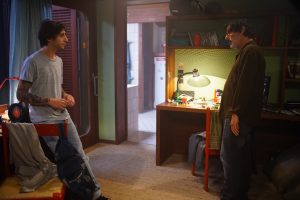 Author and family man Henri Mohen (Yvan Attal, right) tries to motivate his weed-smoking, internet-surfing son, Raphaël (Ben Attal, left), to make something of his life in “My Dog Stupid” (“Mon chien Stupide”), now available for first-run online streaming. Photo by David Koskas, courtesy of Film Distrib US.[/caption]
Author and family man Henri Mohen (Yvan Attal, right) tries to motivate his weed-smoking, internet-surfing son, Raphaël (Ben Attal, left), to make something of his life in “My Dog Stupid” (“Mon chien Stupide”), now available for first-run online streaming. Photo by David Koskas, courtesy of Film Distrib US.[/caption]
For starters, he must look to end the deadlock between these two sets of conditions, using his beliefs to draw the means into his life to make that possible. That calls for breaking the ice that has long been allowed to settle in, which is where Stupid comes in. The canine drastically shakes up life at the Mohen household, and that gets Henri’s foot in the metaphysical door so he can begin to assess the beliefs responsible for where he is and how he got there. The history behind Henri’s fate is crucial. If he wants to know how to change his life (and the beliefs that drive it), he must understand how he arrived where he’s at in the first place. That, in turn, means he needs to examine the beliefs that started this process and set it off on the autopilot it seems to have been on ever since.
Conducting such an analysis may not be easy, though. It truly can be a forest-for-the-trees experience. Which is why it’s so important to invoke beliefs that purposely shake things up, for such changes can expose manifesting thoughts and intents that we’ve been unable or unwilling to recognize, possibly for a very long time. That’s the process that Stupid helps initiate. It’s one that’s continued by the new developments that occur in Henri’s children’s lives. And it becomes most obvious in the relationship between Henri and Cécile, especially when she begins spending considerable time with one of Gaspard’s professors, Fabrice Mazard (Eric Ruf); what begins as a dialogue between them about the failing student’s grades soon morphs into something more, a change that certainly gets Henri’s attention.
With everyone dropping out of his life, Henri must ask himself what these changes represent. Even though he initially seems to enjoy the liberation that his newfound circumstances have provided, they also raise concerns, prompting him to question how he got to where he now is. While saying more here would reveal too much, suffice it to say that the roots of these conditions extend back far longer than he may have realized – long before he made the decision to adopt a big slobbering dog.
[caption id="attachment_11669" align="aligncenter" width="350"] Bored housewife Cécile Mohen (Charlotte Gainsbourg) loathes the unexpected arrival of Stupid, the big, slobbering dog inexplicably adopted by her husband, in writer-director Yvan Attal’s delightful new French comedy-drama, “My Dog Stupid” (“Mon chien Stupide”), now available for first-run online streaming. Photo by David Koskas, courtesy of Film Distrib US.[/caption]
Bored housewife Cécile Mohen (Charlotte Gainsbourg) loathes the unexpected arrival of Stupid, the big, slobbering dog inexplicably adopted by her husband, in writer-director Yvan Attal’s delightful new French comedy-drama, “My Dog Stupid” (“Mon chien Stupide”), now available for first-run online streaming. Photo by David Koskas, courtesy of Film Distrib US.[/caption]
Such introspection provides Henri much-needed perspective, as well as an opportunity to examine and rewrite the beliefs responsible for manifesting his reality. It gives him a chance to understand why his wife and family have treated him as they have, both in the past and presently. It helps unleash creativity in his writing that he hasn’t seen in some time, much to the delight of his publisher, Louise Breuvart (Pascale Arbillot). But, most of all, it enables an opportunity to reinvent his life, a goal he’s been chasing unsuccessfully for quite some time.
Those are significant developments. Some might say that it’s unfortunate it has taken Henri so long to discover the source of his discontent. And, on top of that, he may have some trouble coming to grips with that realization. But, if such revelations make it possible to implement changes that he has long sought to institute, isn’t it worth having to endure some personal growth pains to arrive at that outcome?
This French comedy-drama about the trials and tribulations of a foundering author and family man whose life takes an unexpected and quirky turn with his impulsive adoption of a dim-witted, perpetually randy, ever-slobbering dog serves up far more than what its premise would initially seem to offer. What starts off as a frothy farce gradually turns more introspective, providing characters and viewers much to consider, mixed with a wealth of hearty laughs along the way. With fine performances by writer-director Yvan Attal and Charlotte Gainsbourg, this often-hilarious yet thoughtful tale offers more than just another silly rambunctious dog movie, particularly when it comes to assessing our appreciation of what we have – and what we wish we had – as we enter the second half of our lives, a time to make adjustments while we still have the opportunity to get maximum fulfillment and enjoyment during our remaining years. This supremely delightful release is now available for first-run online streaming.
As many of us find out all too late in life, our time in this reality flies by far more quickly than we often realize, especially once we past the apparent midpoint. In light of that, it only makes sense that we don’t fritter away time and energy in unproductive and unsatisfying pursuits. Squandering our resources on undertakings, individuals and efforts that don’t provide a satisfying return simply isn’t wise. But we’re the only ones who can realistically alter what’s amiss. The sooner we get down to that, the sooner we’ll realize the satisfaction we seek, a process that may find us taking some unusual and unexpected steps – some of which, strangely enough, may come at the end of leash. But what those ventures unleash may genuinely astonish us – especially when life finally throws us some long-sought-after bones.
Copyright © 2020, by Brent Marchant. All rights reserved.
“The Cuban” (2019). Cast: Louis Gossett Jr., Ana Golja, Shohreh Aghdashloo, Lauren Holly, Giacomo Gianniotti, Shiva Negar, Jonathan Keitz, Layla Alizada, Jeffrey R. Smith, Gerry Mendicino, Emily Piggford, Kane Mahon, Tabby Johnson. Director: Sergio Navarretta. Screenplay: Alessandro Piccione. Web site. Trailer.
Many of us tend to believe that we have all the time in the world, especially when we’re young. But, as we age and the days grow shorter, we quickly realize otherwise and seek to make the most of what’s left. However, if we’re unable to bring about such results for ourselves, we may not be able to achieve what we set out to do, adding to the frustration we’re already experiencing – unless, of course, we have help that comes to our rescue. Such are the conditions faced by an aging artist in the touching new drama, “The Cuban.”
At one time, Cuban jazz guitarist Luis Garcia (Louis Gossett Jr.) was one of the greats in his field, performing in nightclubs in Havana and New York with some of the most notable musicians in the business. But now, as he’s about to turn 80, virtually no one remembers him or his work. In fact, he leads a lonely existence in a Canadian nursing home, a dementia patient who spends much of his time staring off into space in a wheelchair, pumped full of antipsychotic drugs to squelch his cantankerous outbursts and keep him docile. But, even though he’s basically being merely warehoused, the staff still makes an obligatory attempt at attending to his basic needs, a generally thankless task assigned by Head Nurse Baker (Lauren Holly) to the newest support staff members. In this case, that’s nursing home aide Mina Ayoub (Ana Golja), a pre-med student who landed the job through her Aunt Bano (Shohreh Aghdashloo), a former physician and head administrator of the facility.
Despite the daunting task of caring for a difficult and often-withdrawn patient, Mina does her level best to find a way to get through to Luis. When Mina learns of his love of Cuban jazz, she sees a window of opportunity, given that she grew up with such music, a favorite of her grandfather with whom she spent much time while growing up in her native Afghanistan. And, even though Mina and her aunt left their homeland behind when they immigrated to Canada, their memories followed them, including Mina’s love of that lively music her grandfather played.
At first, Mina knows little about Luis’s past; she’s just glad to see him start coming out of his withdrawn state when she first hums some of the Cuban melodies and then later plays vinyl editions of them on an old record player. That, along with some clandestinely prepared traditional Cuban food smuggled onto his daily serving trays, works wonders to perk up his spirits and boost his level of physical activity. And, before long, Mina and Luis begin conversing about his past, both personally and professionally, a development that at least momentarily seems to forestall the further onset of his dementia.
Mina is so pleased with these results that the pre-med student begins investigating the impact of music in treating memory loss disorders. She’s encouraged by the findings she uncovers and subsequently steps up her efforts even more by securing a guitar for Luis, courtesy of her boyfriend, Kris (Giacomo Gianniotti). And, together with Kris, her cousin, Zahra (Shiva Negar), and her cousin’s beau, Ethan (Jonathan Keitz), they perform some of Luis’s favorite numbers, dressed in vintage Cuban garb, at the nursing home, a gesture that evokes big beaming smiles across his face. The performance also brings out Mina’s beautiful singing voice, a sign that maybe she’s destined to pursue something other than becoming a doctor, a dream that seems to be more important to her aunt than it is to her.
In taking these steps, however, Mina incurs disapproval from her superiors. Despite the success she’s had in caring for Luis, they believe she’s getting too personally involved. They’re particularly upset when she doesn’t follow the facility’s patient care protocols, most notably her unsanctioned food substitutions, a move that draws the ire of the staff dietician (Jeffrey R. Smith). It doesn’t matter to them that she’s trying to make an old man happy and improve his quality of life; she’s not following the rules.
With her feelings deflated, Mina begins to feel lost. She’s unhappy that she can’t help Luis as she’d like to. What’s more, her relationship with her family and her boyfriend begin to suffer, making matters worse. There must be something she can do, but what? That’s what she must figure out if she hopes to feel personally fulfilled – and to lift the spirits of an ailing old man whose condition may again be worsening, his time potentially running out.
As our days wind down, a question that generally comes to mind is, “How do we want to spend them?” It’s something often asked not only by those whose time is dwindling, but also by those who want the best for them. And, chances are, the answers are unlikely to involve things like endless lab tests, blander than bland food, mind-numbing medications and condescendingly insipid entertainment activities. After a life of fun and frolic, the last thing many of us want is an inane finale that’s about as exciting as a bowl of tepid porridge.
But how do we bring about an ending worth remembering, especially if we’re incapacitated and surrounded by well-meaning caregivers who think they know what’s best for us without realizing the tedium they’re unwittingly inflicting upon us? That’s where we have to draw upon the power of our beliefs to summon the results we want, the outcome that results from the conscious creation process, the philosophy that maintains we draw upon these resources in manifesting the reality we experience. That includes not only what we’re able to muster up for ourselves, but also those who we draw into our lives to act on our behalf when we can’t.
Consider the case of Luis. He’s obviously upset with the circumstances he’s been saddled with at the nursing home. It’s everything he doesn’t want. No wonder he’s become cantankerous and difficult to deal with. But, given his physical condition, what is he to do? He suffers from various ailments, such as heart trouble. And then there’s his mental state, characterized by a consciousness ravaged by the effects of dementia. He’s not in a position to change conditions on his own, no matter how much he might want to. He needs help, but that’s something he can realize for himself, even if he’s not consciously aware of it, by putting forth beliefs aimed at manifesting his aims.
Enter Mina. As a comforting, compassionate soul, she sees what Luis wants and needs, and she makes the effort to help. She believes in providing the necessary assistance and works to bring it about, even if it places her job in jeopardy. In turn, she summons forth the aid she needs to fulfill that goal, drawing upon the help of Kris, Zahra and Ethan, as well as one of Luis’s former colleagues, Clarita (Tabby Johnson), and her friends. It’s a beautiful, jointly wrought co-creation that brings joy to someone so craving it, as well as fulfillment to those who help supply it.
That fulfillment achieves several valuable objectives. To begin with, it gives the providers of that satisfaction something about which they can feel genuinely proud. But there’s more to this than just doing good; there’s also the reminder that we must cherish the time we have in this existence, given how quickly it tends to pass us by. Even those of us who are just starting out our lives can benefit from such a tap on the shoulder, to remember to prize each moment, never squandering them or taking them for granted.
Hints of this come up routinely during the film. Such is the case, for example, for Aunt Bano. Despite her training as a physician back in Afghanistan, she’s no longer accredited to practice as such in Canada, which is why she has been relegated to acting as a nursing home administrator. It’s a ruling that has troubled her ever since she arrived in her new homeland, one that’s left her embittered and feeling separated from her calling. However, as Mina reminds her, there’s no reason why she can’t enroll in a scholastic program that will bring her into compliance with Canadian regulations. And, considering her background and comparatively youthful age, she’s talented, experienced and young enough to avail herself of such an opportunity. But only Bano can make the decision to move forward with that plan, one that rests with her beliefs, ambitions and faith in herself. She must ask herself, “Can I indeed do this?” – and then believe whether or not she can.
Mina and Zahra face similar choices, decisions that again rest with their beliefs. As noted earlier, the emergence of Mina’s singing voice certainly raises legitimate questions about her looming medical career. As for Zahra, who dearly loves Ethan, she must stare down the prospect of an arranged marriage set up by her parents (Kane Mahon, Layla Alizada) to a suitor she’s never met. Will the cousins stick to the paths that are expected of them, or will they follow their hearts and tap into the beliefs that they think best for themselves? Again, the sooner they remain true to their authentic selves, the sooner they’ll be able to maximize the fulfillment they seek in the time they have. And to think that all this comes about through the influence of an aging musician who simply wants to enjoy the days that remain.
This bittersweet tale of an aging jazz musician and the young nursing home attendant who seeks to help him revive his memories of his storied past serves up a warm and touching story with great visuals, a saucy soundtrack and an excellent lead performance by Louis Gossett Jr. Although occasionally formulaic and predictable with a few too many story threads, the picture nevertheless entertains while reminding us all of making the most of what time we’ve each got. The film packs a lot into its runtime, but it gives us much to ponder about ourselves. “The Cuban” is available in limited theatrical and drive-in release, as well as for limited online streaming, but this delightfully colorful and pleasant offering is worth the search.
In an age when callousness and self-interest often take precedence over anything else, it’s heartening to see a story that celebrates kindness and selflessness, especially toward someone like Luis, who’s unable to attend to himself as capably as he might like. But that doesn’t mean he doesn’t have needs, wants and desires that require attention. Which is why the efforts of caring souls like Mina mean so much, not only to those they care for, but also, one hopes, in helping to reshape our reality by enabling those in need to make the most of their lives, no matter how much or how little time they have left. If we were all to adopt beliefs that make such outcomes possible, we might well have a very different world – and a very different quality of life in it. It’s an investment that doesn’t require much from us but pays off far more handsomely than any of us might realize.
Copyright © 2020, by Brent Marchant. All rights reserved.
“Rebuilding Paradise” (2020). Cast: Erin Brockovich-Ellis, Michelle John, Phil John, Steve “Woody” Culleton, Carly Ingersoll, Matt Gates, Zach Boston, Brendan Burje, Krystle Young, Marcus Nelson, Justin Cox, Kayla Cox, Zeke Lunder. Director: Ron Howard. Web site. Trailer.
When all is lost, the will to start over is put to the test. For some, it may be too much. But, for others, those who have the fortitude to recover and begin anew, the challenge may be difficult but not insurmountable. So it has been for many of the residents of a community who experienced utter devastation firsthand, a story chronicled in the riveting and moving new documentary, “Rebuilding Paradise.”
On the morning of November 8, 2018, life in the small northern California town of Paradise changed forever. During a red flag fire season warning, the unthinkable happened: A spark from a Pacific Gas & Electric (PG&E) transmission line set the surrounding woodland on fire. That initially small blaze, combined with an ample supply of timber that had dried out from years of drought and strong upper winds, quickly spread the fire. As the flames raced toward the historic community, residents had virtually no time to flee for their lives, let alone most of their possessions, leaving their residences behind to be incinerated. And, despite efforts to evacuate, the catastrophe still claimed the lives of 85 people, some of whom were overcome by fire in their vehicles in a desperate attempt to escape.
[caption id="attachment_11651" align="aligncenter" width="350"] One of the largest and deadliest wildfires in state history decimates the historic town of Paradise, California in director Ron Howard’s new documentary, “Rebuilding Paradise.” Photo © by Noah Berger, courtesy of National Geographic.[/caption]
One of the largest and deadliest wildfires in state history decimates the historic town of Paradise, California in director Ron Howard’s new documentary, “Rebuilding Paradise.” Photo © by Noah Berger, courtesy of National Geographic.[/caption]
When the flames were finally extinguished, Paradise had been, for all practical purposes, destroyed. The community’s 26,000 residents soon found themselves displaced, and, with nearly all of the town’s structures obliterated, the fire-weary survivors had nowhere to go. Some fled permanently, while others were fortunate enough to find accommodations with relatives in neighboring towns. But, for the rest, this marked the beginning of a displacement to temporary facilities that would go on for months – or longer.
“Rebuilding Paradise” chronicles the saga of the townsfolk through this harrowing ordeal. Beginning with the tragedy itself, the film graphically depicts the horror of the fire with terrifying footage shot from within the inferno. It then shows the aftermath, both on the ground and from above, of a blaze that unrelentingly ravaged the landscape. But the bulk of the documentary examines how Paradise residents have managed in the time since the disaster – their attempts at coping psychologically, their efforts to begin the rebuilding process, their campaign to seek monetary damages from the utility company responsible for the firestorm (aided by consumer advocate Erin Brockovich-Ellis) and their quest to establish new lives for themselves.
Director Ron Howard tells the story of Paradise through the lens of a number of everyday citizens. There’s Police Officer Matt Gates, who played a pivotal role in helping to evacuate Paradise residents on the day of the fire and in assisting in organizing events to boost the morale of the community after the tragedy. School Superintendent Michelle John and her husband, Phil, chairman of the Paradise Ridge Fire Safe Council, worked tirelessly to help get the town’s schoolchildren into makeshift classrooms and to orchestrate ceremonies for the high school’s graduating seniors. Steve “Woody” Culleton, the 74-year-old self-described town drunk who eventually recovered and went on to become mayor, helped lead the charge for homeowners seeking to rebuild their residences, plowing through the seemingly endless red tape that only compounded an already-difficult situation. School psychologist Carly Ingersoll took on the role of crisis counselor to assist students in coping with their circumstances, a responsibility made more difficult by her own trauma, having nearly perished in the fire herself.
[caption id="attachment_11652" align="aligncenter" width="350"] The aftermath of the November 2018 wildfire that destroyed Paradise, California reveals a community in ashes, as seen in the gripping new documentary, “Rebuilding Paradise,” now available for first-run online streaming. Photo courtesy of National Geographic.[/caption]
The aftermath of the November 2018 wildfire that destroyed Paradise, California reveals a community in ashes, as seen in the gripping new documentary, “Rebuilding Paradise,” now available for first-run online streaming. Photo courtesy of National Geographic.[/caption]
In addition to those who played such crucial roles during and after the ordeal, the film profiles those seeking to shape what’s to come. Graduating high school seniors Zach Boston and Brendan Burke, representatives of what is hoped to be the future of Paradise, introspectively reflect on what they lost – and what they hope to regain – as their community attempts to rebuild. Pyrogeographer Zeke Lunder, who helps manage the surrounding forests, particularly where carefully coordinated controlled burns are concerned, speaks to the importance of astute stewardship of the woodlands that make the area such a desirable place to live – and how to keep it safe from future catastrophes. And then there are the families, represented here by Justin and Kayla Cox and Krystle Young and Marcus Nelson, who have been displaced and are looking to make fresh starts, despite the many hardships they face with living space, employment and even marital discord, traumas brought on by a disaster that they never foresaw.
The film also reveals problems that most viewers probably never thought about. For example, there’s the severe environmental impact that has resulted from the release of enormous amounts of toxic chemicals dispersed by the fire. These substances, such as benzene, have become embedded in the ash that coats the landscape, poisoning the soil and even sinking down into the groundwater, making it unsafe for drinking, showering and cleaning, a problem even affecting the few who were fortunate enough not to have lost their homes in the fire. On top of that, asbestos released from older structures that burned now makes certain parcels of land, such as the site of one of the town’s destroyed schools, too dangerous to enter without hazmat suits. Obviously the cleanup effort here involves more than just the removal of charred debris.
Complicating matters even further are the bureaucratic nightmares that have stifled the rebuilding process. Issues involving FEMA, for example, have hindered the approval of permits for new homebuilding, problems brought about by questions involving regulations and, in turn, the funding to comply with them. Indeed, how can residents begin to move ahead if they can’t even get out of the starting blocks? As if there weren’t enough stress in residents’ live already.
[caption id="attachment_11653" align="aligncenter" width="350"] Paradise Police Officer Matt Gates played a pivotal role in helping to evacuate his community during the deadly wildfire that destroyed the historic northern California town as chronicled in director Ron Howard’s new documentary, “Rebuilding Paradise.” Photo courtesy of National Geographic.[/caption]
Paradise Police Officer Matt Gates played a pivotal role in helping to evacuate his community during the deadly wildfire that destroyed the historic northern California town as chronicled in director Ron Howard’s new documentary, “Rebuilding Paradise.” Photo courtesy of National Geographic.[/caption]
However, despite these many challenges, there’s always the human spirit to counteract them, and residents certainly have plenty of that in reserve, as evidenced in the film. They know what it was like to have found paradise, and they certainly don’t want to see it lost forever. Rebuilding Paradise may take a Herculean effort, but mankind has done this before – and there’s no reason why it can’t be done again here, making it possible for Paradise to be restored once more.
Throughout history, man has sought to establish a utopian way of living in a setting that reflects those values. And, over the years, a number of films have attempted to depict this undertaking, such as director Frank Capra’s legendary classic, “Lost Horizon” (1937). So it’s indeed quite heartening that the founders of this historic northern California town would choose the name “Paradise” to characterize the effort they undertook in building and growing their community. However, as the devastation of the fire proved, “paradise” is something precious that requires committed protection to preserve and sustain its existence, for it can be all too easily lost and difficult to recapture.
Rebuilding a burned-out community is indeed a daunting task. With roughly 95% of Paradise destroyed, there’s much to be replaced to restore the town to what it once was. Overcoming the grief associated with this loss alone is a feat calling for extraordinary effort. But, as debilitating as this might seem, this tragedy also provides an opportunity for rebirth, a chance to not only re-create the Paradise that was lost, but to make one that’s even better than before, one that learns from the mistakes of the past to usher in a bright future. To some, that may seem unlikely given what the community is up against. But, for others, it’s a venture to be tackled with the same spirit as those who built it in the first place. It’s an endeavor that they believe in, and that’s crucial to their success, for those beliefs are essential in making the outcome happen. They’re the essence of the conscious creation process, the philosophy that maintains we draw upon these resources in manifesting the reality we experience, including the paradise that they (and that most of us) claim to seek.
[caption id="attachment_11654" align="aligncenter" width="350"] School Superintendent Michelle John joyfully officiates over ceremonies for the 2019 commencement class of Paradise High School, the first group of seniors to graduate after the November 2018 wildfire that destroyed their community, as depicted in “Rebuilding Paradise.” Photo courtesy of National Geographic.[/caption]
School Superintendent Michelle John joyfully officiates over ceremonies for the 2019 commencement class of Paradise High School, the first group of seniors to graduate after the November 2018 wildfire that destroyed their community, as depicted in “Rebuilding Paradise.” Photo courtesy of National Geographic.[/caption]
It’s unclear whether or not the residents of Paradise have heard of this philosophy. But, for those who are committed to rebuilding the community – especially those who have already begun taking the steps to make it happen – it’s apparent that they have a good handle on the principles involved in bringing their dream into being. They recognize the value in this undertaking, and they’re dedicated to making it happen, their belief in the notion steadfastly rooted in their consciousness and, subsequently, in their actions.
Taking on a venture like this is staggering. While it’s true that California has experienced some huge and horrendous fires over the years, virtually nothing compares with this blaze. The aftermath of this incident even calls into question the wisdom of building in a fire zone like this. However, as a number of residents point out, is it wise to establish communities in Tornado Alley, along hurricane-prone seacoasts or in known flood zones? We all have to live somewhere, they contend; why should fire risk be considered any more off-limits than the potential damage that can be caused by any of these other disasters?
To rebuild the town in the wake of the fire and to eliminate some of the hazards that contributed to the devastation, those responsible for devising solutions must seek to overcome limitations that may have previously held them back or that they couldn’t see past in coming up with workable answers to these challenges. That’s where beliefs once again play a role. By stretching their vision and looking for previously untried (or even previously unconceived of) ideas, they have an opportunity to overcome the pitfalls of the past and to establish new paths for the future. The residents of Paradise set an inspiring example for those facing similar dilemmas – and opportunities.
[caption id="attachment_11655" align="aligncenter" width="350"] Former Mayor Steve “Woody” Culleton rebuilds the home he lost in the firestorm that destroyed the historic northern California town of Paradise, as chronicled in director Ron Howard’s new documentary, “Rebuilding Paradise,” now available for first-run online streaming. Photo courtesy of National Geographic.[/caption]
Former Mayor Steve “Woody” Culleton rebuilds the home he lost in the firestorm that destroyed the historic northern California town of Paradise, as chronicled in director Ron Howard’s new documentary, “Rebuilding Paradise,” now available for first-run online streaming. Photo courtesy of National Geographic.[/caption]
It’s also important to note that this is a co-creative effort, one where all the residents of Paradise contribute their thoughts, beliefs, intents, energy and support to rebuild the town. It even includes the input of those who were part of the problem, such as PG&E; after all, the residents of a new Paradise are still going to need electricity, albeit power that’s delivered in a safer manner. For instance, according to a company representative appearing in the film, the antiquated transmission lines that sparked the blaze were built in 1921, and footage shows how easily infrastructural elements like wooden poles in this outmoded system can catch fire. To prevent that from recurring, the company has committed to rebuilding its delivery network with underground lines, a huge and expensive restructuring of its power grid. But, then, tremendous tragedies require tremendous solutions, as this venture illustrates.
This co-creative effort has other dimensions to it as well. In addition to the physical build-out of the community’s homes, businesses and infrastructure, there’s also the quest to seek justice for the damage done by the responsible parties, especially for those families that experienced loss of life. The film illustrates this through one woman’s effort to seek restitution for the loss of her elderly incapacitated father, whose charred wheelchair was found in what was his garden as he made a failed attempt at escape. Conscious creation maintains we’re responsible for what we manifest, including those who run major corporations. Such entities must be held accountable for their actions, especially when they carry consequences that affect others.
In a larger sense, the film also raises the question of global climate change and how it may have contributed to this calamity. While the film doesn’t belabor this point, it nevertheless points out how, as citizens of the Earth, we must all work together in addressing this issue. Using footage from a variety of natural disasters around the world, the film shows how incidents like the Paradise fire are just one example of the devastation that’s being wrought by these tragedies – and in greater frequency and intensity. If we truly all profess to care about the paradise that is this planet, we had better start getting our acts – and our beliefs – together on this front before it’s too late.
[caption id="attachment_11656" align="aligncenter" width="350"] The Cox Family, Justin (left) and Kayla (right), take up residence in a mobile home after the wildfire that destroyed Paradise, California claimed their home, a story chronicled in director Ron Howard’s new documentary, “Rebuilding Paradise,” now available for first-run online streaming. Photo by Lincoln Else, courtesy of National Geographic.[/caption]
The Cox Family, Justin (left) and Kayla (right), take up residence in a mobile home after the wildfire that destroyed Paradise, California claimed their home, a story chronicled in director Ron Howard’s new documentary, “Rebuilding Paradise,” now available for first-run online streaming. Photo by Lincoln Else, courtesy of National Geographic.[/caption]
To a certain degree, evidence of working on this can be seen in the efforts of pyrogeographer Zeke Lunder, whose controlled burn program is designed to clear the forest floor of underbrush that can easily ignite during wildfires and send embers up into the air where it can ignite flames on mature trees. This may be only one small step, but it’s part of the larger effort that is this co-creative undertaking. It may not seem like much, but everything contributes – and helps – in the greater scheme of things.
While the devastation that came out of this tragedy was indeed staggering, there were the proverbial silver linings, too. For example, when the fire encroached on the home of Michelle and Phil John, they received an invitation to come stay with Michelle’s cousin Roni and her husband, Shin, with whom they had been embroiled in a 20-year family feud – an invitation that came unsolicited from Roni and Shin. Even though the Johns’ home was damaged but left standing, Michelle and Phil accepted the invitation and moved in, ending the feud, healing the old wounds and prompting the two couples to become best friends. Who says something good can’t come out of something bad?
In the end, it’s truly inspiring to see what community residents have undertaken to rebuild their town. It’s a reflection of the pioneer spirit that went into its initial establishment. But, perhaps even more importantly, it’s illustrative of the human spirit that seeks to overcome its adversities, no matter how difficult, to recover our losses and to create anew in the spirit of conscious creation philosophy. And, to put an exclamation point on this effort, the name “Paradise” reinforces what its residents are attempting to build, a name that says it all when it comes to characterizing what they’re genuinely trying to manifest for themselves and their progeny.
Director Ron Howard, in a rare documentary effort, does an excellent job in examining the impact of this deadly wildfire, the widespread fallout that has come in its wake and the heroic campaign to begin again. This heart-wrenching yet hopeful offering details the pain and suffering, along with the little victories, experienced by virtually everyone in the community, as well as their determination to rise from the ashes, literally and figuratively. It’s not often that a documentary will move viewers quite as profoundly as this one does, evoking both tears and joy – and making us appreciate what we have and what we can lose in a heartbeat. “Rebuilding Paradise” is easily one of Howard’s best productions in quite a long time and a film well worth seeing. The picture is available for first-run online streaming and in limited theatrical screenings.
The power to overcome can be quite formidable, greater than many of us know, especially when we put our minds (and our beliefs) to it. Our resilience under such duress is a testament to the power behind our ability to create, even under the most dire circumstances. There’s a Paradise that exists within each of us, and it’s possible to bring it forth into being if we believe in the notion. The residents of a small California town are proving that, showing the way for the rest of us and, despite the challenges involved – and succeeding.
Copyright © 2020, by Brent Marchant. All rights reserved.

